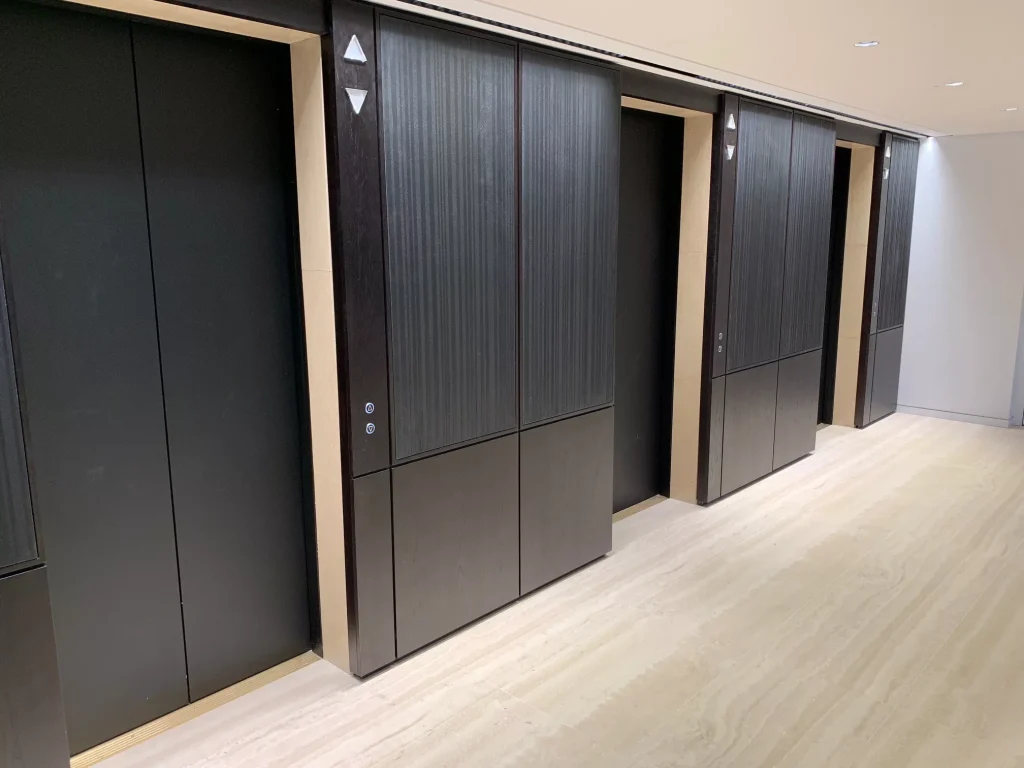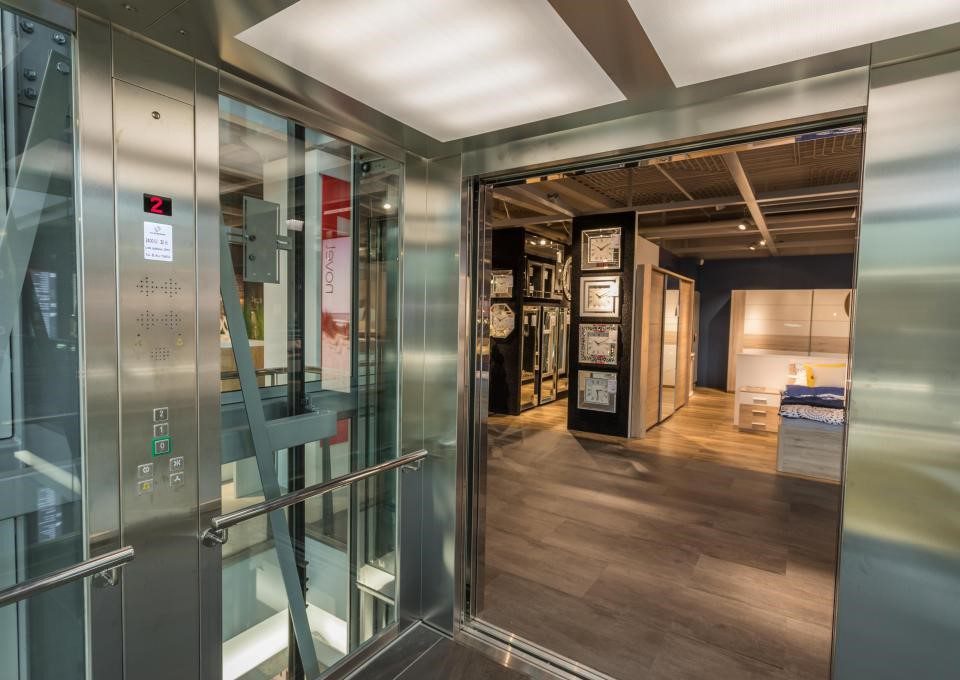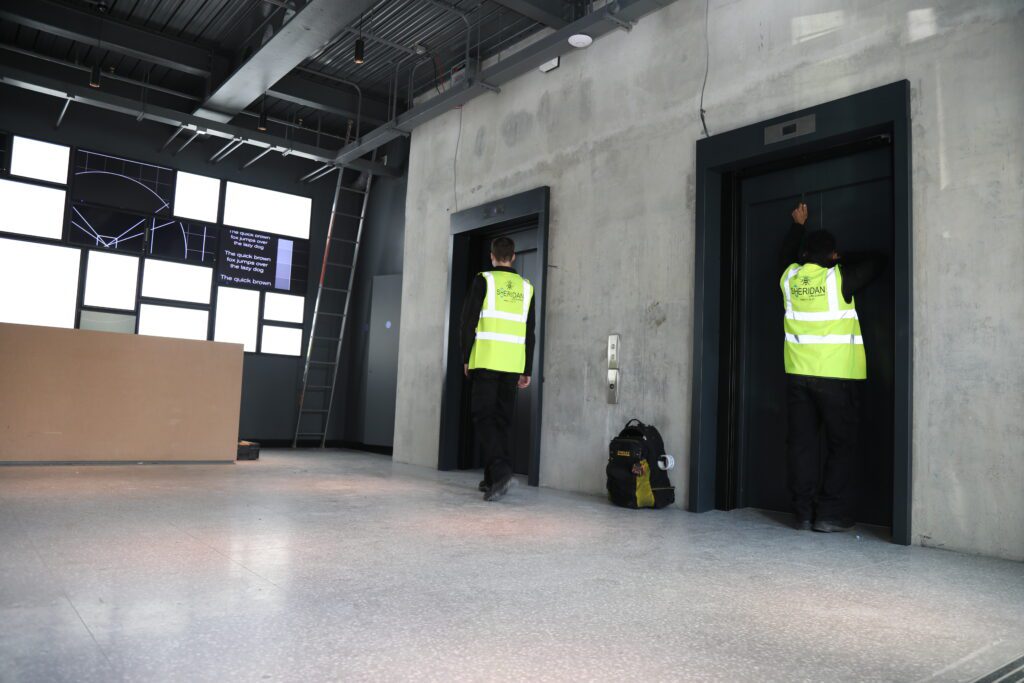When first installing a lift, many companies don’t always realise the importance of regular maintenance. Both from a legal standpoint and in order to keep your lifts running smoothly, lift maintenance is absolutely vital.
But what can happen if you neglect lift maintenance? The answer to this question is something you need to keep in mind if you are responsible for ensuring the upkeep of a lift.
As a company with expertise in installing lifts for transporting passengers, goods or both, we are aware that many sectors need reliable lifts.
The word ‘reliable’ is a key part of that sentence, too. When a lift is out of service, a wide range of problems can result — from impaired safety to legal action levelled against the business meant to keep that lift operating effectively.
These risks naturally beg the question of what you can do to reduce them. The short answer is: invest in a lift maintenance package. Without a regular maintenance package, it’s easy for your lifts to go a long time without being checked by a professional, which opens you up to a whole roster of different risks.
To find out more, or to get a reliable lift maintenance package with Sheridan Lifts, keep reading or get in touch!

What are You Risking When you Neglect Lift Maintenance?
The most important reason to prioritise elevator servicing is the raft of risks that could otherwise be posed to lift users’ safety.
However, when building managers, owners or landlords lack solid, reliable, long-term plans for lift maintenance, the following problems can also result.
Violation of safety codes and regulations
Legally, passenger lifts, i.e. lifts used for transporting people between a building’s floors, must be inspected every six months.
Meanwhile, lifts — such as dumbwaiters — that shift only goods can wait twice as long (yes, every 12 months) for an inspection as per UK law.
The boxes you need to tick with your lift maintenance efforts are detailed across various pieces of legislation, including:
- The Provision and Use of Work Equipment Regulations 1998 (PUWER): These regulations demand that employees use work equipment fit for the intended purpose and in line with suitable safety measures.
- The Lifting Operations and Lifting Equipment Regulations 1998 (LOLER): Though similar to PUWER, these rules more specifically address lift safety. For example, they call for lifts to be suitably marked, strong and stable.
In our ‘Ultimate Guide to Lift Regulations’, we also touch upon some not explicitly mentioned above, such as the Manual Handling Operations Regulations 1992.
Penalties and fines from authorities
Failing to fully comply with lift regulations can land your business in very hot water. The penalties that can arise from non-compliance include:
- Large fines
- Criminal charges
- Imprisonment
PUWER and LOLER regulations are enforced by the Health and Safety Executive (HSE). Inspectors from this government agency can visit your workplace to:
- Examine any elevator equipment
- Measure or photograph lifts
- Question the employer and employees
These inspectors have the power to — when and where necessary — issue enforcement and/or prohibition notices.
If prosecution proceedings need to begin, the inspectors are also able to halt the operations of the company so that this can happen.
Insurance implications
Though your building might be insured, a lack of lift maintenance can risk:
- Denial of claims in case of accidents
- Increased premiums or policy cancellations in the future
The insurance policy’s terms could require you to safeguard LOLER compliance for your lifts.
Damage to your reputation and low customer satisfaction
Since lifts tend to be installed in crowded areas like entrances and lobbies, you can expect news to spread pretty quickly when a lift is out of service. This situation, in turn, can have repercussions for your company’s image.
Think about it: if your visits to a particular corporate building often lead you to see a closed lift with an ‘out of order’ notice or something similar attached to it, you could too easily assume that the workplace as a whole is not well looked after.
Of course, it can also feel frustratingly inconvenient to have to keep taking the stairs when a lift is supposed to be available — especially if you are often in a hurry to get to a particular part of the building by a particular time, or have mobility issues and need additional accessibility considerations.
Cost Considerations
Naturally, elevator servicing will entail a financial outlay from your company. However, lift maintenance can more than pay for itself by helping you to avoid:
- Expensive repairs and replacements: The longer you leave a lift problem unresolved, the worse it is likely to get — and the pricier it is likely to become to sort out. You could even end up needing to replace the entire lift.
- Emergency call-out charges: Though we are certainly willing and able to carry out emergency lift repairs should a lift breakdown occur, prevention is ultimately better than cure — not to mention less expensive.
- Potential legal expenses and fines: Accidents or injuries caused by an insufficiently maintained lift on your premises may require you to pay compensation. Even just falling short of lift regulations can get you fined.
- Increased energy consumption due to inefficiencies: With elevator servicing, we can see whether it would be possible for us to replace any of the lift’s components with newer, more energy-efficient parts.

Lift Maintenance vs Lift Servicing
When it comes to looking after a lift, it is important not to confuse preventative maintenance with lift servicing.
Once you have signed up for one of our lift maintenance packages, you can expect qualified engineers from the Sheridan Lifts team to make regularly scheduled visits to your workplace to inspect a lift’s mechanical components.
Lift servicing differs from lift maintenance in that, rather than being undertaken on a regular, scheduled basis, it is arranged more spontaneously when there is something discernibly off about your lift, but a definite diagnosis still needs to be made by a lift professional.
Three Signs Your Lift is Overdue a Service
Here are a few warning signs that your lift’s performance is starting to falter — a problem you would be able to address by arranging elevator servicing and implementing a maintenance package.
Slow or erratic movement
Lifts installed some time ago could become slow to open their doors. If this starts happening with your lift, the culprit could be debris, dust or rust that has accumulated in the horizontal grooves above and beneath the doors.
With elevator servicing, we can thoroughly clean those grooves. On the other hand, the real underlying problem could be that an integrated circuit in the lift has shorted or turned faulty — in which case, we could fix or replace that circuit.
A lift routinely ascends/descends through the use of ropes and pulleys that, over time, can become misaligned — potentially unbalancing the weight of the lift and leaving it moving erratically within the shaft.
Our elevator servicing specialists can nip this kind of lift-related mechanical fault in the bud — and so prevent the issue from becoming a much larger one.
Inconsistent levelling with floors
A modern lift is supposed to stop at a floor of a building not only smoothly but in a manner leaving this floor parallel with that of the lift itself.
You would have good reason to worry if your lift instead stops abruptly between your workplace building’s floors. This is called ‘mid-levelling’, and can lead passengers to:
- Suffer trips and falls
- Pick up injuries like sprains or broken limbs
- Suffer concussion as a result of a blow to the head
- Trip or fall over when entering or leaving the lift
Mid-levelling can arise from a power failure — whether within or outside the lift’s workings — or a flaw in the elevator’s programming.
These are both examples of problems that elevator maintenance and servicing by an experienced team of lift engineers are capable of pre-empting.
Increased downtime and breakdowns
Fortunately, malfunctioning elevators are almost definitely never going to plummet down shafts in a way you might have often seen in films.
That’s because, typically, a sophisticated web of extremely tough cables would prevent a passenger lift from falling like this even if it completely broke down.
Besides, in the very unlikely event that all of those cables supporting a modern lift snapped, emergency brakes would prevent the chamber from falling any more than a short distance.
Still, none of this is to say that recurrent lift breakdowns aren’t a worry. If you do often find your lift out of service, we urge you to set up a maintenance schedule and have a lift engineer inspect the unit as soon as possible, as a serious mechanical fault could be to blame.
We have qualified engineers who can respond to lift breakdowns in a wide range of geographic areas, including:
- Manchester
- London
- Liverpool
- The Midlands
If elevator equipment within our coverage area needs fixing, we can save money for the client by carrying out repair work before damage to the lift worsens.

The Importance of Regular Lift Maintenance
No matter what type of lift you have, being persistent with its upkeep over the long term can bring about all of the following plus points:
- Ensures safe and reliable operation: Regular lift maintenance isn’t just about keeping a lift running — it’s about ensuring that it can run without springing shocks (or worse) on people who use it.
- Extends the lifespan of the lift: The longer you can keep the same elevator in good operational order, the longer you can also wait before replacing it.
- Reduces the risk of accidents and liabilities: Not only can an improperly maintained lift inflict injuries upon people, it can consequently require you to make hefty payouts in compensation.
- Enhances the overall user experience: Quite simply, keeping up lift maintenance can make many day-to-day lives easier. A well-working lift can give customers an extra reason to keep coming back to your business.
Choose a Lift Maintenance Partner you Can Trust
We offer a range of lift maintenance contracts, enabling you to select one that would be especially cost-effective for your needs.
Neglecting to have a lift serviced regularly can prove a false economy. This is especially the case given the many different benefits you and your business would risk missing out on as a result.
We invite you to enquire about our lift maintenance solutions to learn more about those practical merits.